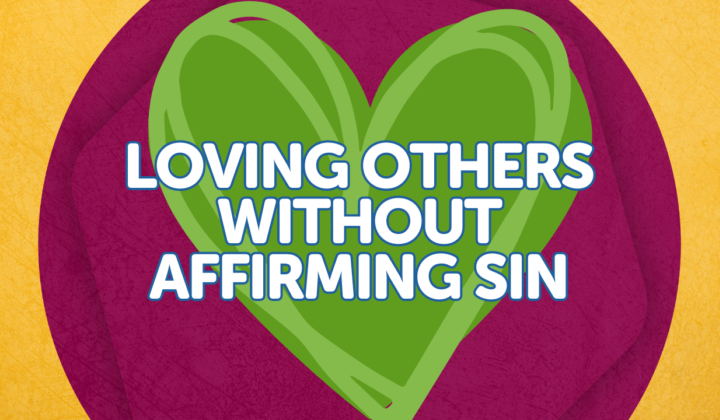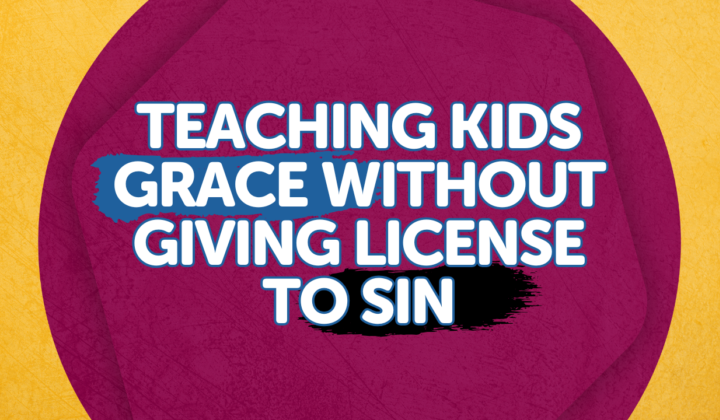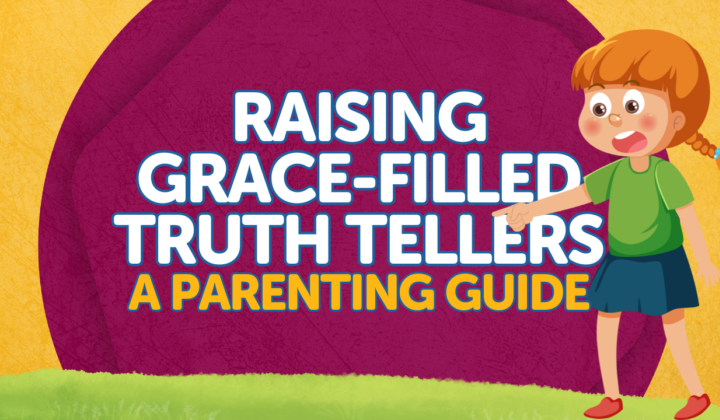Learn more about the journey that led to us equipping kids to carefully evaluate every idea they encounter.
Meet members of our team who have contributed to curriculum development.
Hear from real users of the Foundation Curriculum.
Learn what we believe about God, Jesus, Scripture, and more.
Same-Sex Marriage Books In The Classroom: Parenting Through Cultural Tensions
Hello friends! Today's podcast question says: "My son is currently in pre-K with another child who has two same-sex parents. There has been discussion between the kids regarding this, and now they're being read a book about a homosexual family. How can I teach my son to love but stay firm in the truth?"
This is an important question for us to think through. Teaching our children to love others without affirming sin is crucial, and in today's cultural context, our children are going to be confronted with many lifestyles that do not align with the goodness of God's design for sexuality and gender. So this is a question we're going to dive deep into today on the Foundation Worldview Podcast, where we seek to answer your questions so that you can equip the children that God has placed in your care to carefully evaluate every idea they encounter and understand the truth of the biblical worldview.
I'm your host, Elizabeth Urbanowicz, and I'm thrilled that you've joined me for this episode today.
Exciting Announcement
Before we dive deep into looking at how we can teach our kids to love others without affirming sin, I have an announcement that I'm very excited about. I have written a book that is going to be released in October of 2025, and it is called Helping Your Kids Know God's Good Design: 40 Questions and Answers on Sexuality and Gender.
This book is exactly what it says it is. We look at 40 questions that cover everything from "How do I talk with my child about sex?" to hot-button topics like pornography and masturbation, homosexuality, and more. We examine how we can discuss these concepts with our children from a theologically accurate and developmentally appropriate standpoint.
This book is now available for pre-order on Amazon. If you click on the link we've provided in the show notes, you can get yourself a copy or get all your friends a copy for a book club discussion. There is a pre-release guarantee, which means if you order today, whatever price the book drops to be the lowest between now and when it is released in October of 2025, you are guaranteed the lowest price on that book. This exact question of how to teach your child to love others without affirming that person's sin is answered in even more depth in this book.
Two Parts to This Question
This questioner's question really has two different parts to it. The first question is the practical ins and outs of what to do in this preschool situation. The second is how to train our children in general to love others without affirming that person's sin. First, we'll look at the practical ins and outs for this particular questioner, and I'm sure that there are many other people who are watching or listening who have encountered a similar situation or are walking through a similar situation right now.
The Hard Truth About This Preschool Situation
For this questioner and for anyone else who's walking through a similar situation, what I'm going to say to answer this first question is going to be hard to hear. However, what I'm going to say is true, and so it's really important to be said.
So for this questioner, thank you so much for writing in this question. What I think you need to realize is that if your son is in a preschool class where his teachers are promoting same-sex marriage or a same-sex family structure as a positive or good family situation, you need to remove your son from that class.
I know that's a very strong statement, but let me explain. It's one thing for your son to be in a class with another student or with students who live in homes with same-sex parents. In this cultural context, it is impossible to have our children avoid encountering same-sex couples.
So that's one thing—to have our children in a classroom where another student or students come from homes with same-sex couples. It is a completely different thing to intentionally place our children in settings where those who are in authority over them are promoting same-sex relationships as good. This is different because it isn't just another classmate who is living this out. It is the person who is the authority figure in the classroom telling them that this is a good thing.
Having our children in a setting like this, where those in authority over them are teaching them that sin is good, this is an avoidable situation and it's important for us to pull our children out of settings like this.
Our Children Are Not Missionaries
I think one thing that we might get confused about, but that we have to understand very clearly, is that our young children are not missionaries that we send out into a hostile environment. Our young children are our primary mission field.
Psalm 1:1-2 says: "Blessed is the man who walks not in the counsel of the wicked, nor stands in the way of sinners, nor sits in the seat of scoffers, but his delight is in the law of the Lord, and on his law he meditates day and night."
This is the opening chapter to the book of Psalms, talking about who the blessed person is. If we are placing our children under the authority of those who are actively promoting what the Bible calls sin, we are forcing our children to walk in the counsel of the wicked—the counsel of men and women who are teaching them that wickedness is good.
If we are actively placing our children under the authority of those who are actively promoting what the Bible calls sin, we are forcing them to stand in the way of sinners—men and women who are promoting what God has called sin. We are forcing them to sit in the seat of scoffers—men and women who laugh at the ways of God, calling those ways old-fashioned, oppressive, or even evil.
This psalm is talking about the person who chooses not to do this as blessed. When our kids are in pre-K, even when they're in first grade, second grade, third grade, fourth grade, fifth grade, they don't have a choice of who they are sitting under in an educational setting. But we are keeping them from this blessing of delighting in the law of God and meditating on it day and night by requiring that they walk in the counsel of the wicked, stand in the way of sinners, and sit in the seat of scoffers.
I know that what I just said is difficult to hear. I know I've made very strong statements, but they are biblical. We are not to put our children in those situations where those in authority over them at this very young age are calling wickedness good. It is vital that we not do this, especially in the early formative years.
When our children are in their teen years, that's a different story. It's going to require wisdom and discernment. However, our children are in a completely different developmental place when they're teenagers than when they're in preschool, elementary school, or even middle school.
How to Train Children to Love Without Affirming Sin
Thank you for those of you who are in this situation and have chosen to listen thus far in the podcast. What we're going to move on to now is the second step: How we can train our children to love others without affirming that person's sin.
Step 1: Teach the Goodness of God's Design
The first thing we need to do is teach our children the goodness of God's design. They need to know what God's design is for gender, for sexuality, for marriage, and for family. They need to know this design so that they understand that God's design is inherently good.
If you haven't had these initial conversations with your children yet about the goodness of God's design for gender and sex and marriage, please check out our resource called "The Talk"...Made Easy. It's a really simple three-lesson video series. Each lesson is 10 minutes or under. It just covers the biblical basis of God's good design for male and female, God's good design for sex as the sign and seal of the marriage covenant, and God's good design for reproduction.
Our kids need to know the goodness of God's design before they are exposed to the corruption. So if your child is in a situation where they have already been exposed to the fact that some people live in a home where it's two men who are raising them or two women who are raising them, you're going to need to do a little bit of backpedaling and make sure that you spend a lot of time focusing on the goodness of God's design.
We don't want to focus on the corruption first because then our kids' view of sexuality is going to be tainted. Sexuality is an inherently good thing because it is God's design—it is sin that has corrupted the goodness of that design.
Step 2: Explain How Sin Has Corrupted God's Design
After we have grounded our kids in the goodness of God's design, then we need to explain how sin has corrupted that design. For those of you who have taken your kids already through our God's Good Design curriculum, which is 30 lessons on the goodness of God's design for gender and sexuality and marriage and family, in that curriculum we talk about how sin corrupts God's good design.
When we're explaining homosexuality to kids, we talk about how sometimes because of sin we desire the wrong kind of love in a relationship. So what God designed to be friendship, sometimes people desire to turn that kind of love into a marriage. Rather than being content with just having friends who are the same sex as you, sometimes people actually desire to be married to someone who is the same sex as them. This is desiring the wrong kind of love in a relationship.
Then you can talk about how this isn't the end of the story. In our "God's Good Design" curriculum, we talk about how when Jesus returns, God's good design for us will last forever because Jesus has defeated the power and the punishment of sin.
Step 3: Equip Kids to Love Others Without Affirming Sin
Once we have laid the foundation for understanding God's good design, then explaining how sin has corrupted that good design, the final thing we need to do is to equip our kids to love others without affirming that sin.
In our "God's Good Design" curriculum, we cover a three-step process. We have a whole lesson on how we love others even when they're not following God's good design. That three-step process we give is:
- Recognize this is not God's good design
- Remind yourself of the truth
- Be kind
First, recognize this isn't God's good design. When you know that you have a classmate that has two mommies or two daddies, you recognize this isn't God's good design. God designed marriage to be one man and one woman becoming one flesh for life, and God designed it to be a picture of Jesus and the church. (Those two truths we cover in different lessons in the "God's Good Design" curriculum.)
Then remind yourself of the truth. Teach your child a catechizing phrase that they can say quietly in their mind anytime they encounter a corruption of God's good design. In their mind they can say, "God designed marriage to be one man and one woman becoming one flesh for life. God's design is so good"—something they're going to speak over themselves.
And three, be kind. You treat that classmate and you treat that classmate's parents the same as you would any other classmate and any other classmate's parents.
I know that I've gone through these steps really quickly, but I've mentioned a few times that all of this is covered in detail in our "God's Good Design" curriculum. So if you really want to ground your kids in these truths and transform the way they're thinking and living, I highly recommend you check out "God's Good Design."
Final Thoughts
Again, just wrapping this up for the person who wrote in this question, I know what I said at the beginning was very strong. However, I really wanted to illuminate the truth in this situation, and I would encourage everyone in a similar situation: We need to make sure that we are viewing our children as our primary mission field, and then we need to prayerfully consider how we can place our children in settings where those who are in authority over them are not actively promoting sin.
As I mentioned from Psalm 1, we want to be careful that we are not forcing our children to walk in the counsel of the wicked, to stand in the way of sinners, or to sit in the seat of scoffers. Instead, we want to teach them to delight in the law of the Lord and on that law to meditate day and night.
Take the Next Step in Equipping Your Children
If this episode has resonated with you and you want to go deeper in equipping your children with biblical truth about God's good design for sexuality and relationships, I encourage you to check out Foundation Worldview's "God's Good Design" curriculum. This comprehensive 30-lesson program will give you the tools and confidence you need to have these crucial conversations with your children in an age-appropriate, biblically grounded way.
Don't leave your child's understanding of these foundational topics to chance or to the culture around them. Visit FoundationWorldview.com today to explore our resources and give your family the biblical foundation they need to navigate our changing world with wisdom and love.
Well, that's a wrap for this episode. If you have a question that you would like for me to answer on a future Foundation Worldview podcast, you can submit that question by going to FoundationWorldview.com/podcast.
As we leave our time together, my prayer for you is that no matter the situation in which you and the children God has placed in your care find yourselves, you would trust that God is working all things together for your good by using all things to conform you more into the image of His Son.
Related Posts and insights

Loving Others Without Affirming Sin
In this episode, we dive into the challenging question: how can we teach our children to love others as image-bearers of God while recognizing sin without condoning it? Elizabeth Urbanowicz explores how to balance grace and truth, offering biblical insights to help parents guide their children through this delicate issue. Tune in to learn practical ways to train your children in love, discernment, and understanding the truth of God's Word.

Teaching Kids Grace Without Giving License to Sin
In this episode, Elizabeth Urbanowicz dives into a powerful question: How can parents teach kids about God's grace without inadvertently allowing a permissive view on sin? Using biblical examples and principles from the New Testament, she guides parents on teaching the concepts of grace, repentance, and right living in a way that nurtures both understanding and respect for God’s truth. Tune in to learn practical tips on instilling both right beliefs and actions within your family.

Raising Grace-Filled Truth Tellers: A Parenting Guide
How do you keep kids from publicly pointing out others’ sin while still helping them understand God’s truth? In this episode, Elizabeth Urbanowicz offers a biblical and practical framework for teaching children to recognize sin, remind themselves of God’s design, and respond with kindness. Learn how to equip your children to balance truth and grace in a way that honors God and builds loving relationships.



